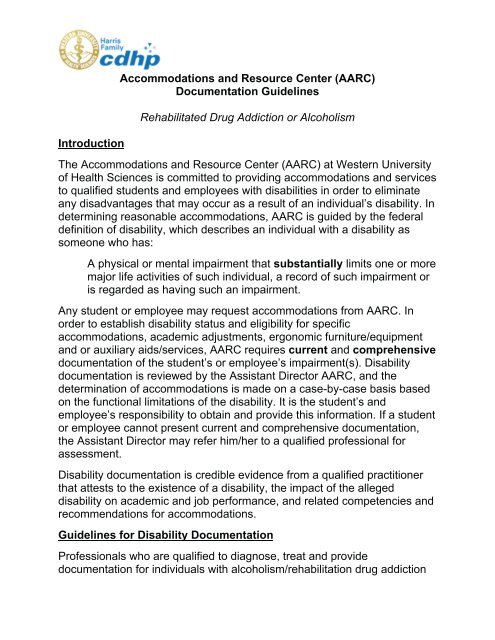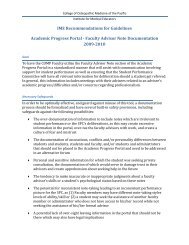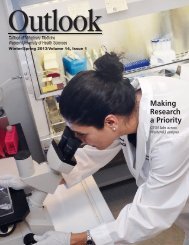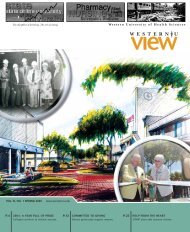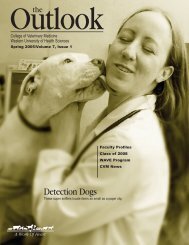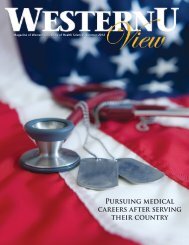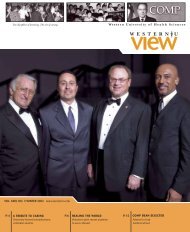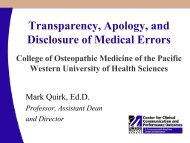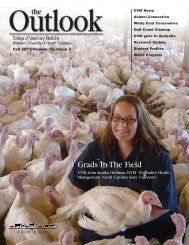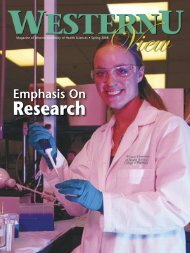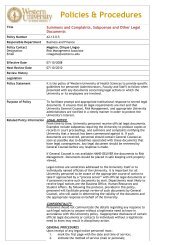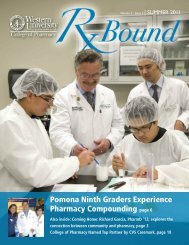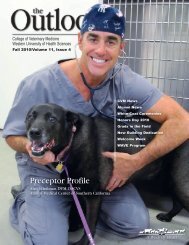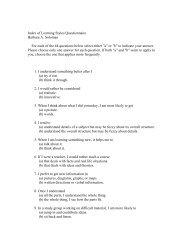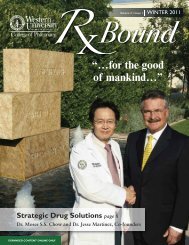Documentation for Alcohol and Rehabilitated Drug Addiction
Documentation for Alcohol and Rehabilitated Drug Addiction
Documentation for Alcohol and Rehabilitated Drug Addiction
- No tags were found...
You also want an ePaper? Increase the reach of your titles
YUMPU automatically turns print PDFs into web optimized ePapers that Google loves.
IntroductionAccommodations <strong>and</strong> Resource Center (AARC)<strong>Documentation</strong> Guidelines<strong>Rehabilitated</strong> <strong>Drug</strong> <strong>Addiction</strong> or <strong>Alcohol</strong>ismThe Accommodations <strong>and</strong> Resource Center (AARC) at Western Universityof Health Sciences is committed to providing accommodations <strong>and</strong> servicesto qualified students <strong>and</strong> employees with disabilities in order to eliminateany disadvantages that may occur as a result of an individual’s disability. Indetermining reasonable accommodations, AARC is guided by the federaldefinition of disability, which describes an individual with a disability assomeone who has:A physical or mental impairment that substantially limits one or moremajor life activities of such individual, a record of such impairment oris regarded as having such an impairment.Any student or employee may request accommodations from AARC. Inorder to establish disability status <strong>and</strong> eligibility <strong>for</strong> specificaccommodations, academic adjustments, ergonomic furniture/equipment<strong>and</strong> or auxiliary aids/services, AARC requires current <strong>and</strong> comprehensivedocumentation of the student’s or employee’s impairment(s). Disabilitydocumentation is reviewed by the Assistant Director AARC, <strong>and</strong> thedetermination of accommodations is made on a case-by-case basis basedon the functional limitations of the disability. It is the student’s <strong>and</strong>employee’s responsibility to obtain <strong>and</strong> provide this in<strong>for</strong>mation. If a studentor employee cannot present current <strong>and</strong> comprehensive documentation,the Assistant Director may refer him/her to a qualified professional <strong>for</strong>assessment.Disability documentation is credible evidence from a qualified practitionerthat attests to the existence of a disability, the impact of the allegeddisability on academic <strong>and</strong> job per<strong>for</strong>mance, <strong>and</strong> related competencies <strong>and</strong>recommendations <strong>for</strong> accommodations.Guidelines <strong>for</strong> Disability <strong>Documentation</strong>Professionals who are qualified to diagnose, treat <strong>and</strong> providedocumentation <strong>for</strong> individuals with alcoholism/rehabilitation drug addiction
include: physicians with a specialty in addiction, clinical psychologists,psychiatrists, licensed mental health professionals, <strong>and</strong> State HealthDepartment certified addiction counselors who are supervised bypsychologists or psychiatrists. The diagnostician must be an impartialindividual who is not a family member of the student or employee.The following guidelines are provided to assist the service provider incollaborating with each student or employee to determine appropriateaccommodations. <strong>Documentation</strong> serves as the foundation that legitimizesa student’s or employee’s request <strong>for</strong> appropriate accommodations.Recommended documentation includes:1. A clear statement of the disability, including the DSM-IV diagnosis<strong>and</strong> a summary of present symptoms.2. <strong>Documentation</strong> <strong>for</strong> eligibility must reflect the current impact thealcoholism has on the student’s or employee’s functioning; (the ageof acceptable documentation is dependent upon the disablingcondition, the current status of the student or employee <strong>and</strong> thestudent’s or employee’s request <strong>for</strong> accommodations).3. A summary of assessment procedures <strong>and</strong> evaluation instrumentsused to make the diagnosis.4. A summary of qualitative <strong>and</strong> quantitative in<strong>for</strong>mation which supportsthe diagnosis.5. Medical in<strong>for</strong>mation related to the student or employee needs toinclude the impact of medication on the student’s or employee’sability to meet the dem<strong>and</strong>s of the postsecondary environment.6. Prior receipt of accommodations does not guarantee receipt of thesame accommodations at Western University of Health Sciences.7. Missing disability documentation in<strong>for</strong>mation may result in a delay inreviewing a student’s or employee’s request <strong>for</strong> accommodations.8. A statement of functional limitations of the disability on learning,working or other major life activity <strong>and</strong> the degree to which it impactsthe individual in the learning or working context <strong>for</strong> whichaccommodations are being requested.Further assessment by an appropriate professional may be required ifcoexisting learning disabilities or other disabling conditions are indicated.The student or employee <strong>and</strong> the Assistant Director AARC collaborateregarding accommodations.


